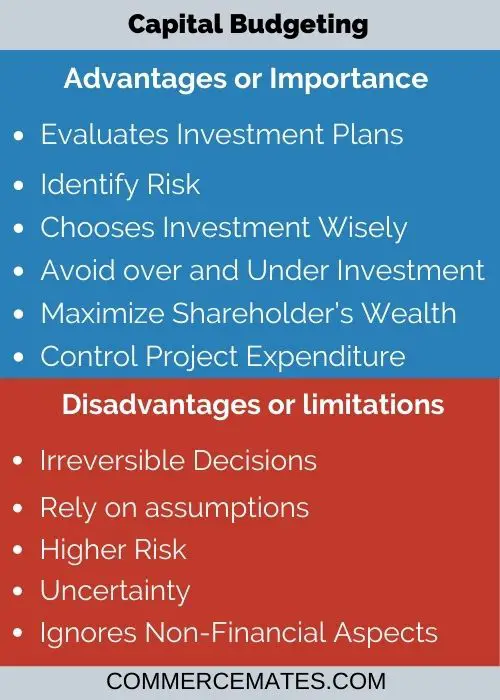Capital Budgeting refers to the investment decisions in capital expenditure incurred by which the benefits are received after one year. Capital expenditure is the expenditure which is occurred in the present time but the benefits of this expenditure or investment are received in future.
Contents
Advantages or Importance of Capital budgeting
Evaluates Investment Plans
Capital budgeting is a key tool used by management for the evaluation of investment projects. It assists in taking decisions regarding long term investments by properly analyzing investment opportunities. Using the capital budgeting techniques-risk, return and investment amount of each project is examined.
Identify Risk
It enables in identifying the risk associated with investment plans. Capital budgeting examines the project from different aspects to find out all possible losses and risks. It studies how these risks affect the return and growth of the business which are helpful in making an appropriate decision.
Chooses Investment Wisely
Capital budgeting plays an effective role in selecting a profitable investment project for the business. It is the one that decides whether a particular project is beneficial to take or not. This technique considers cash flows of investment proposal during its entire life for finding out its profitability. Companies are able to choose investment wisely by analyzing different factors in a competitive market using capital budgeting techniques.
Avoid over and Under Investment
Managers use capital budgeting techniques to determine the appropriate investment amount for the business. The right amount of investment is a must for every business for earning better returns and avoiding losses. Capital budgeting analyses the firm capability and objectives for determining the right investment accordingly.
Maximize Shareholder’s Wealth
Capital budgeting assists in maximizing the overall value of shareholders. It is a tool that enables companies to deploy their funds in the most effective way possible thereby earning huge profits. Companies are able to select investments with higher returns and lower costs which eventually raises the shareholder’s wealth.
Control Project Expenditure
Capital budgeting focuses on minimizing the expenditure of investment projects. While examining the investment proposals, it ensures that the project has an adequate amount of inflows for meeting out its expenses and provide an anticipated return. The selection of effective investment projects helps companies in controlling their expenditure and earning better profits.

Disadvantages or limitations of Capital Budgeting
Irreversible Decisions
The major limitation with capital budgeting is that the decisions taken through this process are long-term and irreversible in nature. Decisions have an impact on the long term durability of the company and require the utmost care while taking them. Any wrong capital budgeting decision would have an adverse effect on profitability and continuity of business.
Rely on assumptions and Estimations
Capital budgeting techniques rely on different assumptions and estimations for analyzing investment projects. Annual cash flow and life of project estimated is not always true and may increase or decrease than the anticipated values. Decisions taken on the basis of these untrue estimations may lead businesses to losses.
Higher Risk
Capital budgeting decisions are riskier in nature as it involves a large amount of capital expenditure. These decisions require the utmost care as it affects the success or failure of every business. Any wrong decisions regarding allotment of funds may lead the business to substantial losses or eventually cause a complete shutdown.
Uncertainty
This process is dependent upon futuristic data which is uncertain for analyzing the investment proposals. Capital budgeting anticipates the future cash inflows and outflows of the project for determining its profitability. The future is always uncertain and data may prove untrue which leads to wrong decisions.
Ignores Non-Financial Aspects
Capital budgeting technique considers only financial aspects and ignores all non-financial aspects while analyzing the investment plans. Non-financial factors have an efficient role in the success and profitability of the project. The real profitability of the project cannot be determined by ignoring these factors.